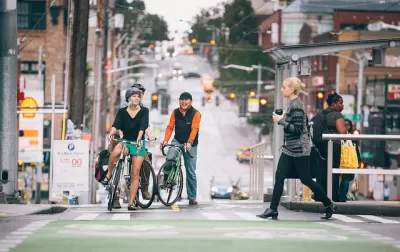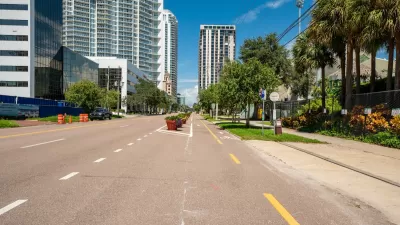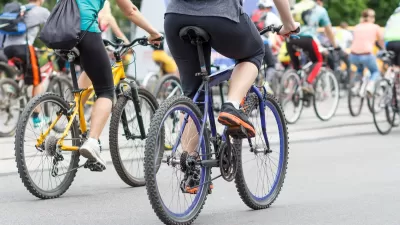Data from cities across the country show that bike helmet laws are enforced more aggressively in communities of color.

After body camera footage showing officers mocking and ultimately ticketing a bicyclist who was injured by a hit-and-run driver in Seattle surfaced, bike and pedestrian advocates in the city are calling for a reckoning with the unintended consequences of Seattle's bike helmet law. Since 2017, 43% of the city's helmet citations "have gone to people who are homeless," prompting questions about the law's uneven application, writes Adina Solomon in The Guardian.
Seattle isn't the only city where data shows bike helmet laws get unequally and unfairly applied:
"Black cyclists are disproportionately stopped in New Orleans, Washington DC and Oakland, California, and law enforcement policies have often overlooked inequity in their system. In Dallas, police have used helmet laws to stop and question cyclists in neighbourhoods of colour, according to a 2014 analysis by the Dallas Morning News. And a 2016 study by the Department of Justice found that Black people accounted for 73% of bicycle stops in Tampa, Florida, while only making up 26% of the population."
According to Charles T. Brown, CEO of urban planning firm Equitable Cities and adjunct professor of planning and public policy at Rutgers University, the laws are "being used as a pretext to stop individuals suspected of more serious drug and weapon charges." Tiffani McCoy, advocacy director for Real Change, agrees. "This is one law that we now know for certain is used as a way to criminalize poverty and in a racially motivated way," she says.
"But there are measures beyond helmet laws and policing that can help ensure the safety of all cyclists," writes Solomon. Since Seattle lowered vehicle speed limits to 25mph on many of its streets in December 2019, case studies show a 20% to 40% drop in collisions, and advocates believe that other measures such as "proper lighting for nighttime riding, protected bike lanes and recreational trail networks that connect to key destinations" can have a meaningful impact on reducing crashes and improving safety for people on bikes. "Before there is law, there should be investment and bicycle infrastructure in the communities that need the investments the most," said Brown.
FULL STORY: How US helmet laws are used against cyclists of colour and homeless people

Maui's Vacation Rental Debate Turns Ugly
Verbal attacks, misinformation campaigns and fistfights plague a high-stakes debate to convert thousands of vacation rentals into long-term housing.

Planetizen Federal Action Tracker
A weekly monitor of how Trump’s orders and actions are impacting planners and planning in America.

In Urban Planning, AI Prompting Could be the New Design Thinking
Creativity has long been key to great urban design. What if we see AI as our new creative partner?

King County Supportive Housing Program Offers Hope for Unhoused Residents
The county is taking a ‘Housing First’ approach that prioritizes getting people into housing, then offering wraparound supportive services.

Researchers Use AI to Get Clearer Picture of US Housing
Analysts are using artificial intelligence to supercharge their research by allowing them to comb through data faster. Though these AI tools can be error prone, they save time and housing researchers are optimistic about the future.

Making Shared Micromobility More Inclusive
Cities and shared mobility system operators can do more to include people with disabilities in planning and operations, per a new report.
Urban Design for Planners 1: Software Tools
This six-course series explores essential urban design concepts using open source software and equips planners with the tools they need to participate fully in the urban design process.
Planning for Universal Design
Learn the tools for implementing Universal Design in planning regulations.
planning NEXT
Appalachian Highlands Housing Partners
Mpact (founded as Rail~Volution)
City of Camden Redevelopment Agency
City of Astoria
City of Portland
City of Laramie





























